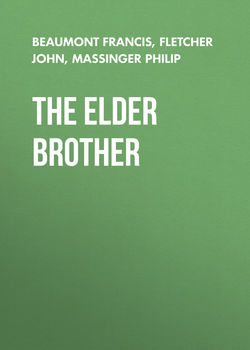Читать книгу The Elder Brother - Beaumont Francis - Страница 1
NOTE:
ОглавлениеThe text of the present volume was passed for press by Arnold Glover and some progress had been made in his lifetime in the collection of the material given in the Appendix. Mrs. Glover's help has again been most valuable in the completion of the work.
The Elder Brother is printed entirely in prose in the Second Folio, and I have therefore printed in the Appendix the play in verse, as it appeared in the First Quarto. The case is an interesting one, and readers will be glad, I think, to have both forms in the same volume.
I have not concerned myself with passages in the Second Folio in prose which have since been printed as verse. On the whole I agree with a recent critic who characterises as 'vexatious' the 'later practice of printing much manifest prose as verse, each post-seventeenth century editor apparently making it a point of honour to discover metre where no one had found it before, and where no one with an ear can find it now.'
I am glad to have had the opportunity of seeing the 1625 manuscript of Demetrius and Enanthe, the play first printed in a somewhat mutilated form in the First Folio of 1647, where it is called The Humorous Lieutenant. It is stated in the Dictionary of National Biography (Vol. XIX, p. 306) that this MS. is preserved in the Dyce Library but the statement is incorrect. The MS. has never been a part of the Dyce collection. It was printed by Dyce in 1830 and after that date it rested for many years in obscurity. To Mrs. Glover is due the credit for having traced it to its present home. For help in this search our thanks are due to Lord Stanley of Alderley, to W.R.M. Wynne, Esq., of Peniarth, Towyn, Merioneth (whose father owned the MS. and left a note in his copy of Dyce's reprint that he had given the MS. to his "old friend the late W. Ormsby Gore, Esq., M.P. for North Shropshire") and to Lord Harlech, the grandson of Mr. Ormsby Gore. Lord Harlech re-discovered the MS. in his library at Brogyntyn, Oswestry, and he has very kindly permitted a thorough examination of it. Dyce's 1830 publication is described as a reprint "verbatim et literatim," but it has little claim to be so called. The punctuation is altered throughout, the spelling is altered in scores of words and though the actual verbal differences between the original MS. and Dyce's reprint of it are not very many, yet these occur here and there throughout the play. Later editors, therefore, relying upon Dyce, have been led into recording as 'MS.' readings variations which do not occur in the MS. A brief description of the MS. will be found in the Appendix, pp. 509-18, together with the passages omitted from the Folios and a complete record of the verbal variations. The present collation omits readings incorrectly given by Dyce.
The third volume of this text will be ready immediately and good progress is being made with the remaining volumes. When the publication of the entire text is completed it is intended to print, by way of a commentary thereon, a companion volume containing a series of explanatory notes upon the text, a glossary and whatsoever supplementary material may be deemed to be of use to the student or to the general reader.
A.R. WALLER. CAMBRIDGE, 30 January, 1906.
THE ELDER BROTHER, A COMEDY
Persons Represented in the Play.
Lewis, a Lord.
Miramont, a Gentleman.
Brisac, a Justice, Brother to Miramont.
Charles, a Scholar, \ Sons to
Eustace, a Courtier, / Brisac.
Egremont, \ two Courtiers, friends to
Cowsy, / Eustace.
Andrew, Servant to Charles.
Cook, \ Servants to
Butler, / Brisac.
Priest.
Notary.
Servants.
Officers.
Angellina, Daughter to Lewis.
Sylvia, her Woman.
Lilly, Wife to Andrew.
Ladies.
LECTORI
Wouldst thou all Wit, all Comick Art survey? Read here and wonder; Fletcher writ the Play.
